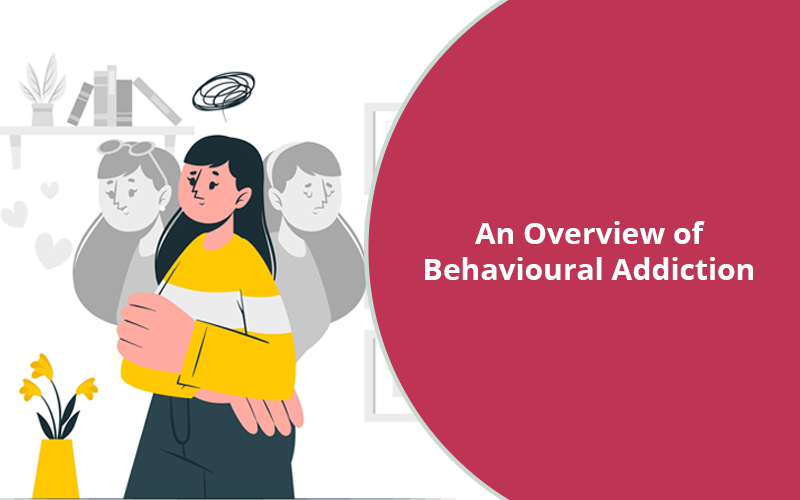An Overview of Behavioural Addiction

Behavioral addiction refers to the compulsive engagement in certain activities, despite negative consequences. Common examples include gaming, gambling, or excessive use of the internet. These behaviors can lead to significant impairments in daily life and may share similarities with substance addiction. Seeking professional help is crucial for managing and overcoming behavioral addictions.
Behavioral addictions encompass various activities. Common types include:
(1) Gaming addiction, also known as Internet Gaming Disorder, is a behavioral addiction characterized by the compulsive and excessive use of video games, often to the detriment of other aspects of life. It has been recognized as a mental health disorder in some diagnostic frameworks, such as the World Health Organization's International Classification of Diseases (ICD-11).
(2) Internet Addiction: also referred to as problematic internet use or internet gaming disorder, is a term used to describe excessive and compulsive internet usage that interferes with daily life, work, relationships, and overall well-being. While it's not officially recognized as a separate mental health disorder in all diagnostic manuals, it has been the subject of research and discussion.
(3) Gambling addiction: also known as pathological gambling or gambling disorder, is characterized by a persistent and maladaptive pattern of gambling behavior that disrupts personal, family, or vocational pursuits. It is recognized as a mental health disorder in diagnostic manuals such as the Diagnostic and Statistical Manual of Mental Disorders (DSM-5).
(4) Shopping Addiction: Uncontrolled and excessive shopping, often driven by emotional needs rather than practical necessity. In the modern consumer-driven society, the allure of shopping can sometimes transform from a harmless leisure activity into a more serious concern known as shopping addiction. This compulsive and excessive shopping behavior can lead to financial strain, emotional distress, and strained relationships.
(5) Exercise Addiction: An unhealthy obsession with physical fitness, leading to overtraining and neglect of other aspects of life. In a world that increasingly emphasizes the importance of physical fitness, the concept of exercise addiction has emerged as a lesser-known but significant concern. While regular exercise is crucial for maintaining a healthy lifestyle, excessive and compulsive engagement in physical activity can transform this positive habit into a potentially harmful behavior. This article aims to shed light on exercise addiction, exploring its characteristics, potential causes, and offering guidance on achieving a balanced approach to fitness.
(6) Food Addiction: Compulsive overeating or specific eating behaviors that become problematic. In a world where food is not just sustenance but often a source of pleasure, the concept of food addiction has gained recognition as a complex and challenging issue. Similar to other behavioral addictions, such as gambling or substance abuse, food addiction involves a compulsive and unhealthy relationship with eating.
(7) Work Addiction: An unhealthy preoccupation with work, leading to neglect of personal life and well-being. Work addiction, also known as Workaholic, is a behavioral addiction characterized by an excessive and compulsive preoccupation with work. Individuals with work addiction often prioritize their professional responsibilities to an extreme degree, often at the expense of other aspects of their lives, such as personal relationships, leisure activities, and self-care. Work addiction is not simply a strong work ethic or dedication to one's job; rather, it involves a compulsive need to work, driven by internal pressures or external factors.
(8) Sex addiction, also known as hypersexuality or compulsive sexual behavior, is characterized by an individual's intense and uncontrollable preoccupation with sexual thoughts, fantasies, or behaviors. It involves engaging in sexual activities to an excessive and detrimental extent, often despite negative consequences. It's important to note that the concept of sex addiction is debated among mental health professionals, and not all experts agree on its classification as an official disorder. However, it is acknowledged and treated by some clinicians and addiction specialists.
(9) Spiritual Addiction: The term "spiritual addiction" is not officially recognized as a mental health disorder in widely accepted diagnostic manuals like the DSM-5. However, it is sometimes used colloquially to describe an excessive or imbalanced preoccupation with spiritual practices or beliefs that may negatively impact an individual's well-being and daily functioning.
Treatment for behavioral addiction typically involves psychotherapy, counseling, support groups, and, in some cases, medication. Recognizing the signs, addressing underlying issues, and developing healthier coping mechanisms are essential components of managing and overcoming behavioral addictions. Seeking professional help is crucial for individuals struggling with these patterns of behavior.








